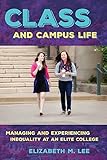Class and Campus Life : Managing and Experiencing Inequality at an Elite College / Elizabeth M. Lee.
Material type: TextPublisher: Ithaca, NY : Cornell University Press, [2016]Copyright date: ©2016Description: 1 online resource (280 p.) : 1 tableContent type:
TextPublisher: Ithaca, NY : Cornell University Press, [2016]Copyright date: ©2016Description: 1 online resource (280 p.) : 1 tableContent type: - 9781501703898
- Class consciousness -- United States
- College environment -- United States
- Educational sociology -- United States -- Cross-cultural studies
- Elite (Social sciences) -- Education (Higher) -- United States
- Intercultural communication -- United States
- Students with social disabilities -- Education (Higher) -- United States
- Women college students -- United States -- Social conditions
- Women's colleges -- United States
- Education & History Of Education
- Sociology & Social Science
- EDUCATION / Higher
- Social class, campus, inequality, higher education, classism, college
- 370
- online - DeGruyter
| Item type | Current library | Call number | URL | Status | Notes | Barcode | |
|---|---|---|---|---|---|---|---|
 eBook
eBook
|
Biblioteca "Angelicum" Pont. Univ. S.Tommaso d'Aquino Nuvola online | online - DeGruyter (Browse shelf(Opens below)) | Online access | Not for loan (Accesso limitato) | Accesso per gli utenti autorizzati / Access for authorized users | (dgr)9781501703898 |
Frontmatter -- Contents -- Acknowledgments -- Introduction -- 1. College Dreams, College Plans -- 2. “Scholarship Girls”: Creating Community and Diversity on Campus -- 3. “Are you my friend, or are you classist?”: Confronting and Avoiding Inequality among Peers -- 4. Activism and Representation: Organizing Class -- 5. Silence vs. Empowerment: Class Inequality in Formal Settings -- 6. After College: Class and Mobility -- Conclusion -- Appendix: Methods -- Notes -- Bibliography -- Index
restricted access online access with authorization star
http://purl.org/coar/access_right/c_16ec
In 2015, the New York Times reported, "The bright children of janitors and nail salon workers, bus drivers and fast-food cooks may not have grown up with the edifying vacations, museum excursions, daily doses of NPR and prep schools that groom Ivy applicants, but they are coveted candidates for elite campuses." What happens to academically talented but economically challenged "first-gen" students when they arrive on campus? Class markers aren’t always visible from a distance, but socioeconomic differences permeate campus life—and the inner experiences of students—in real and sometimes unexpected ways. In Class and Campus Life, Elizabeth M. Lee shows how class differences are enacted and negotiated by students, faculty, and administrators at an elite liberal arts college for women located in the Northeast. Using material from two years of fieldwork and more than 140 interviews with students, faculty, administrators, and alumnae at the pseudonymous Linden College, Lee adds depth to our understanding of inequality in higher education. An essential part of her analysis is to illuminate the ways in which the students’ and the college’s practices interact, rather than evaluating them separately, as seemingly unrelated spheres. She also analyzes underlying moral judgments brought to light through cultural connotations of merit, hard work by individuals, and making it on your own that permeate American higher education. Using students’ own descriptions and understandings of their experiences to illustrate the complexity of these issues, Lee shows how the lived experience of socioeconomic difference is often defined in moral, as well as economic, terms, and that tensions, often unspoken, undermine students’ senses of belonging.
Mode of access: Internet via World Wide Web.
In English.
Description based on online resource; title from PDF title page (publisher's Web site, viewed 26. Apr 2024)


